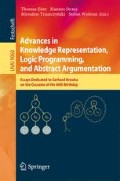Abstract
Decision making may involve multiple viewpoints which are comparing the given options according to different preference relations. The paper studies questions that arise when multiple viewpoints are merged into a single one. It shows how more specific preference statements over the merged viewpoint can override ceteris-paribus preferences resulting from aggregating the preferences of the individual viewpoints.
This paper is a fully revised version of an article of same title published in the AAAI Technical Report WS-07-10 and of which the author has retained the ownership.
Access this chapter
Tax calculation will be finalised at checkout
Purchases are for personal use only
Preview
Unable to display preview. Download preview PDF.
References
Aho, A.V., Garey, M.R., Ullman, J.D.: The Transitive Reduction of a Directed Graph. SIAM Journal on Computing 1(2), 131–137 (1972)
Brafman, R.I., Dimopoulos, Y.: Extended Semantics and Optimization Algortihms for CP-Networks. Computational Intelligence 20(2), 218–245 (2004)
Brewka, G.: Belief revision in a framework for default reasoning. In: Fuhrmann, A., Morreau, M. (eds.) The Logic of Theory Change. LNCS, vol. 465, pp. 206–222. Springer, Heidelberg (1991)
Gärdenfors, P.: Knowledge in Flux: Modeling the Dynamics of Epistemic States. College Publications (2008)
Junker, U.: Relationships between Assumptions. Ph.D. thesis, University of Kaiserslautern, Kaiserslautern (1992)
Junker, U.: Preferences in an Open World. In: Rossi, F., Tsoukias, A. (eds.) ADT 2009. LNCS, vol. 5783, pp. 215–224. Springer, Heidelberg (2009)
Wicker, A.W., Doyle, J.: Comparing preferences expressed by CP-networks. In: AAAI Workshop on Advances in Preference Handling, pp. 128–133. AAAI (2008)
Author information
Authors and Affiliations
Editor information
Editors and Affiliations
Rights and permissions
Copyright information
© 2015 Springer International Publishing Switzerland
About this chapter
Cite this chapter
Junker, U. (2015). Upside-Down Preference Reversal: How to Override Ceteris-Paribus Preferences?. In: Eiter, T., Strass, H., Truszczyński, M., Woltran, S. (eds) Advances in Knowledge Representation, Logic Programming, and Abstract Argumentation. Lecture Notes in Computer Science(), vol 9060. Springer, Cham. https://doi.org/10.1007/978-3-319-14726-0_13
Download citation
DOI: https://doi.org/10.1007/978-3-319-14726-0_13
Publisher Name: Springer, Cham
Print ISBN: 978-3-319-14725-3
Online ISBN: 978-3-319-14726-0
eBook Packages: Computer ScienceComputer Science (R0)

